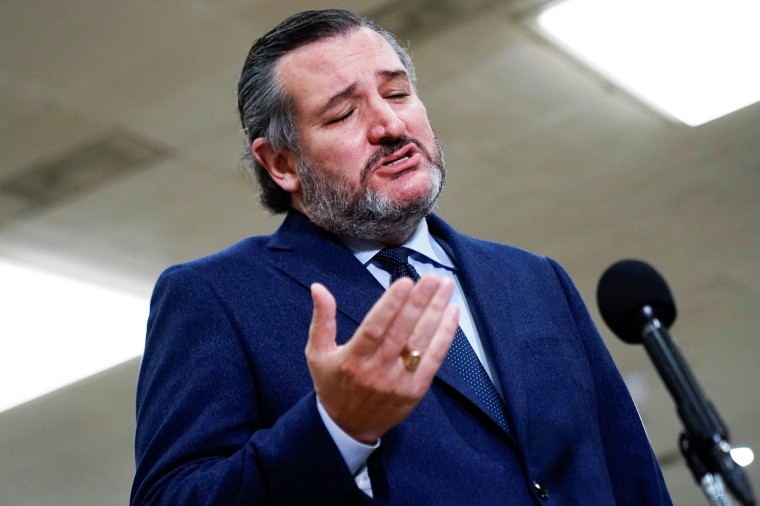When Sen. Ted Cruz (R-Texas) took aim at the Democrats' COVID relief package, the senator focused special attention on the idea that "child molesters" would get direct-aid checks. (Of course, by that reasoning, the same is true of the Trump-era relief packages, which Cruz voted for.)
Last week, the Texas Republican spoke to a group of state GOP lawmakers and maintained a similar focus: Cruz warned that Democrats are trying to expand voting rights to "child molesters" by way of the "For the People Act."
Putting aside questions of the senator's preferred boogeyman, Cruz went on to argue, "H.R. 1's only objective is to ensure that Democrats can never again lose another election." Asked if there's room for a possible compromise on voting rights, the senator responded, "No."
At face value, the rhetoric was oddly self-defeating: Cruz seems to believe that the more Americans are allowed to freely participate in their own democracy's electoral process, the more likely it is that Republicans will lose. But just below the surface, the Associated Press did a nice job putting the Texan's rhetoric in a larger context:
Cruz's statements, recorded by a person on the call and obtained by The Associated Press, capture the building intensity behind Republicans' nationwide campaign to restrict access to the ballot. From statehouses to Washington, the fight over who can vote and how — often cast as "voting integrity" — has galvanized a Republican Party in search of unifying mission in the post-Trump era. For a powerful network of conservatives, voting restrictions are now viewed as a political life-or-death debate, and the fight has all-but eclipsed traditional Republican issues like abortion, gun rights and tax cuts as an organizing tool.
To be sure, the Republican Party's policy agenda, to the extent that the platform-free GOP has something resembling an agenda, was already thin. But in 2021, the aperture has narrowed further: making it harder for Americans to vote is the goal Republicans are prioritizing above any other consideration.
It helps explain why, according to the Brennan Center, more than 253 bills restricting voting access had been carried over, pre-filed, or introduced in 43 states, as of late last week. A recent Washington Post analysis added that the GOP push to impose new voting restrictions may very well amount to "the most sweeping contraction of ballot access in the United States since the end of Reconstruction."
What's of particular interest, though, is the degree to which the larger Republican apparatus has found it necessary to toe the line. The New York Times reported over the weekend, for example, on social-conservative organizations -- which ordinarily focus on the culture war, not the war on voting -- shifting their messaging accordingly.
Passing new restrictions on voting — in particular, tougher limits on early voting and vote-by-mail — is now at the heart of the right's strategy to keep donors and voters engaged as Mr. Trump fades from public view and leaves a void in the Republican Party that no other figure or issue has filled. In recent weeks, many of the most prominent and well-organized groups that power the G.O.P.'s vast voter turnout efforts have directed their resources toward a campaign to restrict when and how people can vote, with a focus on the emergency policies that states enacted last year to make casting a ballot during a pandemic easier.
The Susan B. Anthony List's principal focus has long been opposition to abortion rights. The American Principles Project has worked specifically on opposing civil rights protections for L.G.B.T.Q. people. FreedomWorks' priority has been on government spending and the size of government. The Family Research Council has been a leading voice on a wide variety of religious-right issues for decades.
Each are now prioritizing voting restrictions in their messaging.
This is not simply a matter of partisan loyalties, with conservative groups siding with their Republican allies. It appears there's something deeper going on: so much of the nation's far-right base has come to accept the Big Lie about the 2020 elections that conservative donors are keeping their money in their wallets, convinced that the system is rigged against them. From the Times' article:
[A]fter Donald J. Trump lost his bid for a second term and convinced millions of Americans that nonexistent fraud was to blame, [the Susan B. Anthony List and the American Principles Project] found that many of their donors were thinking of throwing in the towel. Why, donors argued, should they give any money if Democrats were going to game the system to their advantage, recalled Frank Cannon, the senior strategist for both groups.
Obviously, in reality, Democrats actually earned more votes, not by "gaming the system," but through free and fair elections.
But so long as a big chunk of the Republican base believes otherwise, the right faces an existential crisis of sorts: GOP officials and their allies have to impose voting restrictions, not just to win elections, but to keep their supporters motivated, engaged, and contributing.

